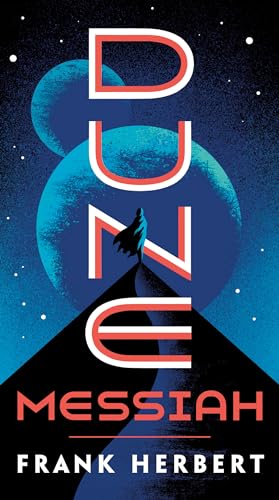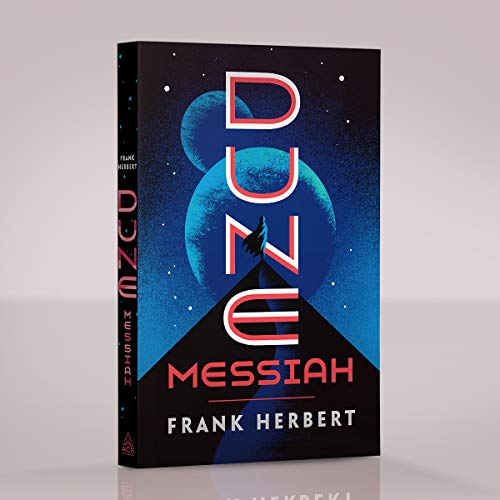Alright, spice fans, buckle up! This is my review of a real mind-bender. Think you know what happens when a hero sits on a throne? Think again. Dune Messiah does not care about your happy endings or easy answers. If you liked the first book because of the action and sandworms, get ready for a lot less worm and a lot more drama. I read this one with my friends and let me tell you, we argued for days about what was actually going on. There’s power struggles, religious headaches, betrayals left and right, and enough “I saw that coming” moments to make you dizzy. Let’s get into it (but not with a sandworm, I promise)!
Dune Messiah by Frank Herbert: Spoiler-Free Summary
In a nutshell
Dune Messiah is the second book in Frank Herbert’s famous science fiction series. After all the sand-blasted action in Dune, this time you get more political intrigue, religious twists, and tough choices. Paul Atreides, now Emperor, faces problems that make your last group project look easy. Herbert explores big ideas like power, faith, and fate, all wrapped up in a world with spice, sand, and not nearly enough sunscreen.
This book mixes classic space opera with some very deep thoughts. If you like your sci-fi with a side of brain-bending drama, this one brings it. Just don’t expect to see giant worms at every turn!
Paul Atreides and the Heavy Crown: Power, Sandworms, and Sleepless Nights
If you thought being a galactic emperor was all about fancy hats and sand surfing, Dune Messiah will quickly spoil that dream faster than you can say ‘spice latte’. In this book, Paul Atreides has gotten everything he wanted and now wishes he’d just stayed home binge-watching old vids with Duncan Idaho. Paul’s struggle with power is like trying to ride a sandworm with no saddle — it looks cool from a distance, but nobody tells you about the sore butt after.
What makes Paul’s journey fascinating is how bored he gets with being an all-powerful messiah. Absolute power does weird things to a guy. He’s surrounded by advisors who talk too much, enemies who glare too much, and his own mother who’s just trying to keep him from wrecking the universe. Even the Fremen, who once put Paul on a pedestal, now sometimes seem to give him those, ‘Dude, what have you done?’ looks. To make things worse, Paul starts seeing into the future. You’d think this would help with power, but instead, it just gives him a massive headache. Every choice Paul makes seems to cause six more problems, like chopping off the head of a very angry space hydra.
Paul’s power doesn’t set him free – it traps him. I felt bad for him, but also wanted to yell, “Buddy, you should have read the fine print!” Next up, let’s spice things up and talk about how religion and prophecy really mess with everyone’s heads in this desert sandbox.
The Tangled Web of Religion and Prophecy in Dune Messiah
If you thought being the “chosen one” in Dune Messiah sounded like a free ride to glory, think again. Frank Herbert’s sequel shows what happens when you turn prophecy into public policy. Suddenly, every move Paul Atreides makes is dissected by zealots, doubters, and everyone in between. You know that awkward feeling when you promise your friend you’ll help move and then 30 people show up expecting you to move the whole city? That’s Paul, but with religion.
The Fremen believe Paul is their messiah. This devotion is both a blessing and a curse, like getting free pizza for life—but the catch is, it’s always pineapple. Paul wants to use belief to bring order, but holy moly, it backfires faster than a broken spice harvester. Religious manipulation starts to eat Paul from the inside-out. He tries to walk the line between leading his people and becoming a puppet of their expectations. Spoiler alert: the line is thinner than a sandworm’s patience.
Prophecy, in the world of Dune Messiah, acts like a cosmic GPS with a broken reroute button. Every action Paul takes is haunted by visions of disaster. If he follows prophecy, doom. If he fights against it, also doom. No wonder he always looks like he needs a nap. The consequences of using religion as a tool shape not just Paul’s fate, but the entire galactic order.
And just when you think things can’t get more tangled, let’s talk about intrigue and betrayal—because a little backstabbing always spices up the holy narrative!
Intrigue and Betrayal Among Factions in Dune Messiah
If you thought your last family reunion was awkward, wait until you get a load of the backstabbing and sneakiness in Dune Messiah. Frank Herbert really knows how to set a table for disaster. Between the Bene Gesserit, the Guild, and the Tleilaxu, no one’s safe—not even the spice itself.
The drama starts with everyone scheming in dark corners. The Bene Gesserit, who are basically the universe’s nosiest grandmas, have their own plans simmering. They want a piece of Paul Atreides’ empire, but they don’t want to get their hands dirty (too much sand, honestly). The Spacing Guild? Well, they just want to keep space Uber running—and they don’t like it when Paul starts messing with their profits.
And who could forget the Tleilaxu? These fellas are as slippery as a sandworm in oil. They bring their own brand of trouble, cooking up gholas and genetic experiments like it’s a fun science fair. Nothing says trust like someone offering your dead best friend back, right?
The real treat in Dune Messiah is how all these groups weave their plots. Friend turns against friend, allies keep secrets, and the whole thing feels like a deadly game of musical chairs where the music keeps getting weirder. It’s intense, it’s stressful, and as someone who’s had my share of Risk board game betrayals, I felt right at home.
But all these secrets come at a cost. Betrayal isn’t just a plot device; it’s a way of life on Arrakis. Next up, let’s wade into the deep end—how does seeing the future mess with your right to choose your own breakfast, let alone your destiny?
How Seeing the Future Messes With Free Will in Dune Messiah
Frank Herbert clearly hated easy choices. In Dune Messiah, Paul Atreides sees so many possible futures, he could open a psychic travel agency. But here’s the kicker—his talent for prescience makes him a prisoner to fate. Every decision Paul makes feels like walking through a maze where all exits are dead ends. I read this on my couch and felt anxious for Paul. It’s like when I peek at the last page of a mystery novel, and it ruins all the fun. Only for Paul, it’s every second of his life!
Paul’s visions show him tragedy, suffering, and his people’s future. But even with all this knowledge, he can’t change much. The more he tries, the more trapped he gets. I once tried to plan my whole week, and by Tuesday, everything collapsed! Paul has it a million times worse—his foresight doesn’t free him. It squeezes the life out of his choices. It’s a real pickle. I bet even Yoda would throw up his hands at these odds.
Herbert uses Paul’s struggle to question if knowing too much about the future takes away your freedom. Would you want the power to see what’s coming if it meant you could never change it? It’s probably the book’s best theme, and it kept my brain spinning for days. Herbert’s writing sometimes gets chatty and clunky, but man, the ideas stick with you like sand in your socks.
So, do I recommend Dune Messiah? Yep—if you like your sci-fi with real dilemmas and your heroes tortured by cosmic bad luck. Just maybe keep your fortune-telling to horoscopes.
Conclusion
Well, that wraps up my review of Dune Messiah. This is one weird, twisty book! Frank Herbert throws you into a mess of religious plotting, political backstabbing, and poor Paul just trying to deal with being super famous and seeing the future (which, let me tell you, sounds horrible). While I missed the giant sandworms, I had a blast arguing with my friends about all the mind games. The slow pace and heavy thinking can be a slog, but if you loved the first Dune book or want to watch a hero get chewed up by his own legend, this one is worth your time. Bring snacks. You might need them. And a notebook. Maybe a flowchart. Alright, that’s it—review over!



